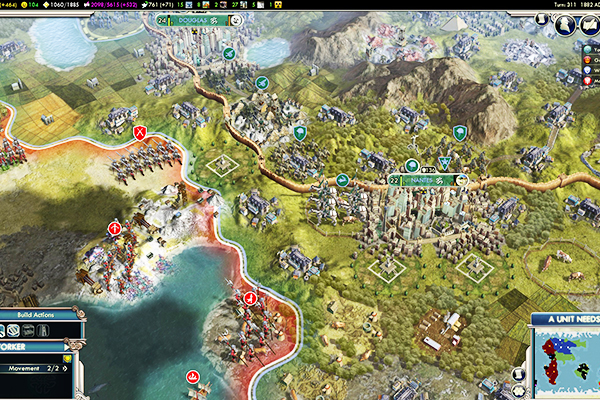Civilization V: Gods and Kings
Developer: Firaxis | Platform: PC, OSX | Genre: Turn Based Strategy
The basic idea remains the same. Start off with a single city, and build more. Civilization V reins in your dreams of a sprawling empire somewhat, discouraging the building of too many cities by pumping up the “unhappiness” of your populace more quickly – and unhappy people, as the French revolution has taught us, are a bitch to rule. Cities can be fortified with buildings which provide passive bonuses, units that contribute your ever-massing forces, and wonders, providing better, more interesting bonuses but that can only be built once in the entire game-world.
It’s a tangible change from Civ IV. It used to be that Joan of Arc’s vast network of interlinked settlements was as powerful as it was impressive looking. In Civ V, Ghandi’s singular juggernaut Mumbai can be just as effective. It might be less viscerally satisfying, and it’s hard to think of a terribly good justification for it. However, Civ V’s upgrades to combat and hexagonal tiles (seriously, continents actually resemble landmasses rather than weird square blocks) make it impossible to return to Civ IV. The exercise of stacking as many units as you could onto a single tile in some sort of bizarre human pyramid has been replaced with the tactical placement of units on a tile each. This change, in addition to adding ranged units, takes what was the worst element of Civ IV and transforms it into the strength of Civ V – engaging in the wanton destruction of other civilisations’ cities is now possibly the most entertaining way of playing. Archers finally function like actual archers; they have range, and need not be placed immediately adjacent to a pack of vicious elephant warriors.
The Gods and Kings expansion adds two discrete elements into the game: one is richly integrated into the mechanics of core Civilization, while the other is merely an exercise in ticking a couple of boxes. Espionage, while fun in theory, boils down to gaining a new spy in every age, secretly shipping them off to a city, and “stealing” a technology dozens of turns later. Religion adds a whole heap of new elements to play. Not only could you found a brand new religion, “Criticism” perhaps, and win the game through sheer piety, it’s also possible for a religion to enhance other methods of victory. A blood-soaked bible that is the foundation of your civilization’s culture adds, as you would expect, military bonuses to your forces.
Gods and Kings adds to what was already a great game, and although the total package is not quite as mechanically perfect as Civ IV, it’s still engrossing and addictive as ever. The improvements along with the stunning graphics and UI make it a pleasure to play, and you’ll find yourself up at three in the morning in a radioactively fueled diplomatic standoff between Ghandi and Catherine the Great. Just one more turn…



